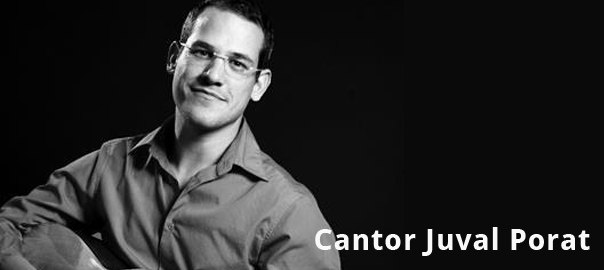The Hashtags of High Holidays

By Cantor Juval Porat
This article first appeared in G’vanim, September/October 2016 issue.
In the world of hashtags, tweets, taggings, and posts there’s one tagline that’s been making the rounds among my colleagues and friends.
#whatcantorsdo accompanies posts and pictures of cantors proudly standing by a bar/bat mitzvah student, rehearsing a piece of music, getting ready for services, or offering words of consolation and insight on world and lifecycle events. When cantors get together at conferences and retreats, it becomes obvious how united we are in our passions and commitments while we still recognize what makes each of us unique.
This notion of honoring one’s uniqueness in a crowd of equally special individuals reminds me a bit of the somewhat controversial, well known piece of liturgy with which many services conclude – the Aleinu (its fame is largely due to the melody, which is based on a German drinking song). In the Aleinu we recognize the differences among the peoples of the Earth and are called to embrace this as truth and responsibility.
If you’d like to learn more about the Aleinu, its origins, alternative interpretations, melodies and English translations, I invite you to visit my class on September 20th at BCC. BCC’s faithful pianist Jeanelle LaMance and I will do our best to present you with the many ways prayer can be heard and felt and understood by utilizing the many ways Aleinu has been introduced to communities.
Along with the BCC choir, Jeanelle and I have been working hard in preparation for the High Holidays to provide you with music that is accessible, inspiring, and at times challenging. Together with my co-clergy, Rabbi Lisa and Rabbi Heather, we carefully assemble a service flow that consists of many intentional moments of awe, meditation, community, joy and remembrance.
Whether it’s a High Holiday planning meeting, or a Shabbat planning meeting, our clergy meetings are packed. We hardly ever end up discussing only the matter for which we have come together. We bring news headlines into our meetings and search for ways to frame them in a spiritual context. We share innovations gathered at conferences or retreats to see how they might fit the BCC community. We support each other and listen to each other and try to remain open and curious to new ideas and perspectives. If you were to summarize all of the above in one neat hashtag, I’d go with #thisiswhatthiscantordoes
I truly cherish this work, and I wouldn’t be doing it if I didn’t feel it was meaningful. I didn’t get to check off my list all that I had planned for 5776, but looking back at the Jewish year I’m filled with humility for the privilege of trying to bring people closer to their divine selves through (Jewish) music ancient and new – whether it’s at funerals, at a deathbed of a congregant or at a wedding, welcoming ceremonies of newborn, congregational meetings and communal gatherings and concerts. I’m filled with gratitude for the opportunity to introduce precious guest speakers who visit our community through spoken words and song and allow them to shine for who they are and the gifts they bring. I am grateful for the writing of music with partners. I am grateful for the retreats and conferences, the hours of studying and meditation, all the musicians with whom I’ve collaborated during services and concerts, and all the congregants with whom I’ve met for coffee and who shared time with me, providing me with a glimpse into their lives and me providing them with a glimpse into mine. I’m grateful for being able to be there for some of my colleagues in moments of challenge and discomfort and for the opportunity to interact with other musical organizations in Los Angeles who aspire to give voice and spiritual expression for LGBTQ people from all walks of life. If I were to summarize all of the above in one neat hashtag, I’d go with #thisiswhatthiscantordidlastyear
For 5777 and beyond I wish to find more ways to draw closer all those folks who’ve been alienated by organized religion. I’d like to explore how BCC, as the world’s first(!) place of worship for LGBTQ Jews and their allies, can further be a place of joy and safety to all, providing ritual and liturgy for those in non-”traditional” relationships, asexual people, non-Ashkenazi Jews, Jews of color and non conforming ones. And I’m excited for going through the process of exploration with the BCC community and my co-clergy. Will you join me? If I were to summarize all of the above in one neat hashtag, I’d go with #thisiswhatthiscantorhopestodonextyear We open up our High Holiday services by singing Pitchu Li:
Open the gates of justice for me,
I will enter them and thank God. (Psalm 118:19-20)
The Psalmist recognizes that access to what’s behind the gates of justice is not to be taken for granted. When there’s a need to ask for the gates to open it implies that certain conditions need to be met, and it is after these conditions are met that access is granted. What conditions will need to be met for you to pass through the gates of justice this year?
It is my wish for us all to utilize this upcoming High Holiday season to reconnect with ourselves once more, to truly get a new insight of what drives us, what we’re passionate about, and what we’re excited to spend our lives with and for. If I were to summarize all of the above in one neat hashtag, I’d go with #whathumansdo
A sweet new year to you and yours,
B’shalom,
Juval




